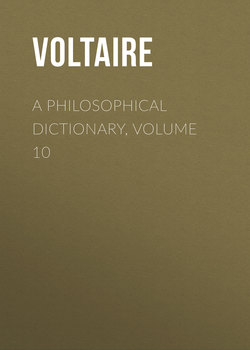Читать книгу A Philosophical Dictionary, Volume 10 - Voltaire, Вольтер - Страница 12
TERELAS
ОглавлениеTerelas, Pterelas, or Pterlaus, just which you please, was the son of Taphus, or Taphius. Which signifies what you say? Gently, I will tell you. This Terelas had a golden lock, to which was attached the destiny of the town of Taphia, and what is more, this lock rendered Terelas immortal, as he would not die while this lock remained upon his head; for this reason he never combed it, lest he should comb it off. An immortality, however, which depends upon a lock of hair, is not the most certain of all things.
Amphitryon, general of the republic of Thebes, besieged Taphia, and the daughter of King Terelas became desperately in love with him on seeing him pass the ramparts. Thus excited, she stole to her father in the dead of night, cut off his golden lock, and sent it to the general, in consequence of which the town was taken, and Terelas killed. Some learned men assure us, that it was the wife of Terelas who played him this ill turn; and as they ground their opinions upon great authorities, it might be rendered the subject of a useful dissertation. I confess that I am somewhat inclined to be of the opinion of those learned persons, as it appears to me that a wife is usually less timorous than a daughter.
The same thing happened to Nisus, king of Megara, which town was besieged by Minos. Scylla, the daughter of Nisus, became madly in love with him; and although in point of fact, her father did not possess a lock of gold, he had one of purple, and it is known that on this lock depended equally his life and the fate of the Megarian Empire. To oblige Minos, the dutiful Scylla cut it off, and presented it to her lover.
"All the history of Minos is true," writes the profound Bannier; "and this is attested by all antiquity." I believe it precisely as I do that of Terelas, but I am embarrassed between the profound Calmet and the profound Huet. Calmet is of opinion, that the adventure of the lock of Nisus presented to Minos, and that of Terelas given to Amphitryon, are obviously taken from the genuine history of Samson. Huet the demonstrator, on the contrary shows, that Minos is evidently Moses, as cutting out the letters n and e, one of these names is the anagram of the other.
But, notwithstanding the demonstration of Huet, I am entirely on the side of the refined Dom Calmet, and for those who are of the opinion that all which relates to the locks of Terelas and of Nisus is connected with the hair of Samson. The most convincing of my triumphant reasons is, that without reference to the family of Terelas, with the metamorphoses of which I am unacquainted, it is certain that Scylla was changed into a lark, and her father Nisus into a sparrow-hawk. Now, Bochart being of opinion that a sparrow-hawk is called "neis" in Hebrew, I thence conclude, that the history of Terelas, Amphitryon, Nisus, and Minos is copied from the history of Samson.
I am aware that a dreadful sect has arisen in our days, equally detested by God and man, who pretend that the Greek fables are more ancient than the Jewish history; that the Greeks never heard a word of Samson any more than of Adam, Eve, Cain, Abel, etc., which names are not cited by any Greek author. They assert, as we have modestly intimated – in the articles on "Bacchus" and "Jew" – that the Greeks could not possibly take anything from the Jews, but that the Jews might derive something from the Greeks.
I answer with the doctor Hayet, the doctor Gauchat, the ex-Jesuit Patouillet, and the ex-Jesuit Paulian, that this is the most damnable heresy which ever issued from hell; that it was formerly anathematized in full parliament, on petition, and condemned in the report of the Sieur P.; and finally, that if indulgence be extended to those who support such frightful systems, there will be no more certainty in the world; but that Antichrist will quickly arrive, if he has not come already.
